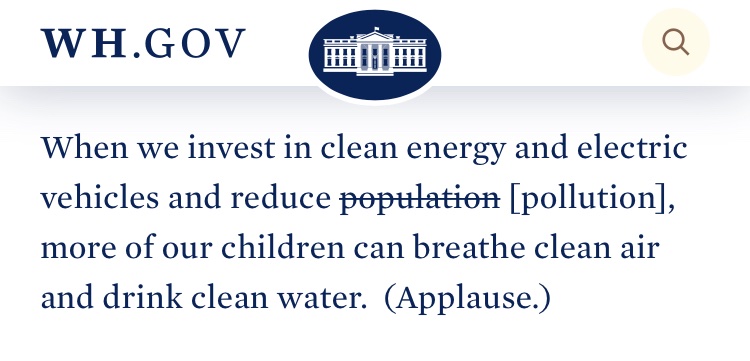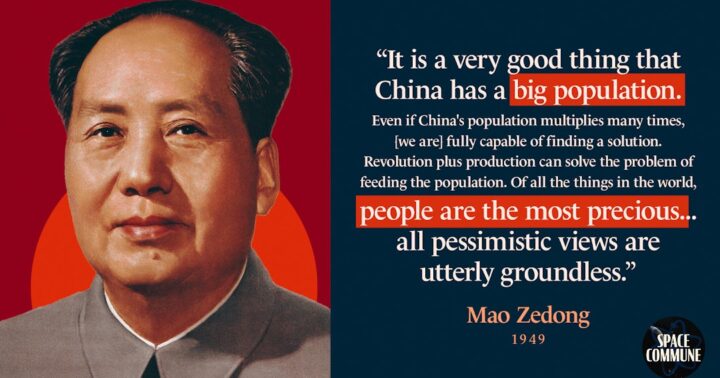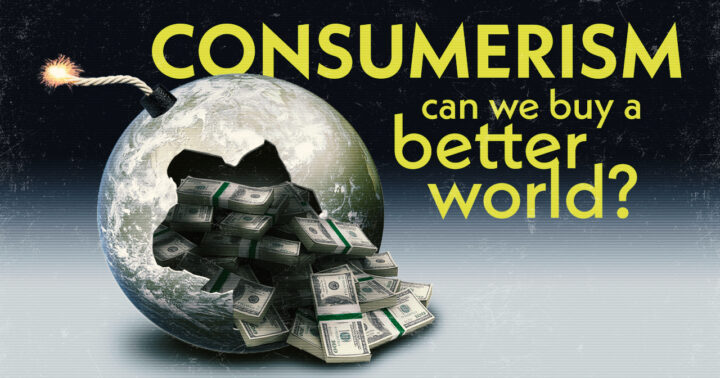Sometimes those in power let the truth slip out. On Friday, Vice President Kamala Harris stated in her remarks at Coppin State University in Baltimore, Maryland:
“When we invest in clean energy and electric vehicles and reduce population, more of our children can breathe clean air and drink clean water.”
Did you catch that? Yes, she did just advocate for “reducing population.” The White House quickly released a transcript of the VP’s remarks with a clear correction. She meant to say “pollution” not “population.” Verbal slip ups are commonplace for Harris. It’s not far-fetched at all to believe that she really meant to say “pollution” – not “population.”

But does it really make a difference? It doesn’t. The truth is that “pollution,” as a political term, has always been shorthand for “population.”
Pollution is a subjective term that requires context. It implies that a thing had formerly contained a level of purity and was defiled, or polluted. Of course this requires the subjective value judgment of what is considered “pure” in the first place. For example: there is something very satisfying when the first winter snow falls, a blanket of white snow covers the ground. Everything looks soft, smooth and pure. At some point, I have to walk through that snow, shovel it to get my car out. The purity of that initial snowfall has been polluted with footprints and mud.

But was there anything actually pure about the snow? No, it was a subjective, aesthetic value judgment by me about the snow. It looked pretty. When I polluted the pure white snow with my footsteps I wasn’t doing any real harm to anything or anyone. In fact, walking through the snow and shoveling my car out allowed me to go to the grocery store. You could say, the net good of getting myself fed outweighed the negative of having the pure, white snow polluted with human footprints.
This is a quaint example. When people invoke pollution, they are usually referring to things more serious than footsteps in pure white snow. Pollution is most often invoked when talking about the byproduct of industrial production, especially in energy production via fossil fuels. While it is true that burning fossil fuel creates some negative externalities, specifically particulate matter that poses potential threats to human health if too much enters our air, water or food—the positives are rarely considered and weighed against the negatives. Some of the benefits of fossil fuel combustion include, but are not limited to abundant and affordable electricity and improved agricultural yield.
As Alex Epstein argues:
The world is experiencing unprecedented safety from extreme weather thanks to fossil fuels—because fossil fuels’ benefits in protecting us from extreme weather overwhelm any negative climate side-effects.
On the UN’s Intergovernmental Panel on Climate Change Epstein writes:
- Instead of factoring in negative and positive impacts of CO2, the IPCC is almost exclusively focused on negatives—despite the huge positive impacts of CO2 fertilization as well as warming in a world where cold-related deaths far exceed heat-related deaths.
- By ignoring the massive benefits, including climate mastery benefits of fossil fuels, and by almost exclusively focusing on negative side-effects, the IPCC reports totally deny the fact that fossil fuels are making the world better and better, including safer from climate.
The important takeaway here is how the focus is placed on negative vs positive impacts — which brings us back to the subjective view. Fossil fuel has been, by far, a net positive discovery for humanity, even if we factor in the negative externalities — its “pollution” — or defiling of pure, untouched nature in the form of particulates being imposed on virginal bodies of air, water and land. By placing the overwhelming amount of focus on the “pollution” angle of fossil fuel combustion, our leaders imply that this subjective view is the most important view — the purity of untouched nature outweighs the material benefits (abundant energy and agriculture) — of mankind as a whole.
If we use very basic logic to analyze the ideas that dominate our current political world, we can see very quickly that the purity of nature is valued over human well-being. The term ‘pollution’ creates a layer of separation from the very vulgar thing it stands in for: overpopulation. As we saw with Vice President Harris, if you say the quiet part too loud, you will face public backlash. Despite this, there will always voices that are willing to be candid. In 1991, The Club of Rome published a book titled The First Global Revolution. The conclusion of Chapter V: The Vacuum, states:
The Common Enemy of Humanity Is Man
In searching for a new enemy to unite us, we came up with the idea that pollution, the threat of global warming, water shortages, famine and the like would fit the bill. In their totality and in their interactions these phenomena do constitute a common threat which demands the solidarity of all peoples. But in designating them as the enemy, we fall into the trap about which we have already warned, namely mistaking symptoms for causes. All these dangers are caused by human intervention and it is only through changed attitudes and behaviour that they can be overcome. The real enemy, then, is humanity itself.
In this context, pollution is not just a negative externality, it is a symptom of the root problem — humanity itself. It’s very clear here, that the enemy of the ruling class is humankind, who is subjectively defiling the purity of nature. Human life is less valuable than nature, according to this subjective ideology. Once we have understood this logic, it’s easy to see why emphasis of the negative externalities of fossil fuel dominate political messaging bellowing out from every corner of the media. The underlying message is that the purity of nature is more important than human life.
In 1968, the Sierra Club published a book by conservation biologist Paul Ehrlich called The Population Bomb. Ehrlich writes:
I have just scratched the surface of the problem of environmental deterioration, but I hope that I have at least convinced you that subtle ecological effects may be much more important than obvious ‘pollution.’ The causal chain of the deterioration is easily followed to its source. Too many cars, too many factories, too much detergent, too much pesticide, multiplying contrails, inadequate sewage treatment plants, too little water, too much carbon dioxide all can be traced easily to too many people.
The problem, for Ehrlich, isn’t solving negative externalities of the technological, economic and poverty-reducing progress of mankind — it is mankind — “too many people” — or as Vice President Harris says, population, that is the ultimate problem.



what it all boils down to is these creeps hate and fear Human creativity. Elites like predictability. Unpredictability scares them. That’s why all of their scientific views are Gradualist, and Darwinian Evolution is Gradualist. People on Youtube today, such as Breadtube Atheists and Hardcore Metal Atheists who come out in defense of feminism and science against pro-male advocates, are big fans of Dawkins. The discussion today devolves down into “Either you are tin-foil hat, irrational believer in a Creator or you believe in Darwinian Evolution.”
But this dialectic ignores the fact that there were other, competing, theories of evolution based on reason at the same time as Darwin, but Darwin was promoted above all of the others because of his Entropic, Gradualist view and because of his connection to British high society. In the Gradualist view, random mutation alone provides for all of the genetic diversity so it takes millions of years for speciation to occur. Then, out of that genetic diversity, Natural Selection whittles it all down to less genetic diversity over time due to genotypes being selected out. It is a very Entropic view and mirrors the Thermodynamic view of available energy decreasing over time in a closed system where the entire Universe is treated like your gas tank. Such a big assumption. As opposed to an Open System with abundant and new energy always coming in to it.
The upshot in this Gradualist view of Evolution is that, since it takes millions of years for new species to form, mankind’s industrial and growth activity will reduce this species diversity too quickly in comparison for the time it takes for new species to form, so it provides endless opportunity for fearmongers to come in and scare people about “impending doom” and the destruction of fishing economies, agriculture, and so on from human activity. Species Diversity WILL come back, but because it will take millions of years according to Darwinian logic, it won’t be in time for us to replenish our fishes, forests, and the things of Nature that we use to survive.
But this is not what’s actually happening out there in the field. Under-posted and buried science stories appear all the time about how animal and plant species are adapting quickly to the presence of Human infrastructure. Even new species are branching off. Quickly too. Hybrids, and so on. And Humans are increasing biodiversity all the time and re-greening deserts. But these stories are buried down the Orwellian memory hole.
Contrast the Darwinian Accidentalist view to the Vernadsky-ian view of Evolution, where Mankind is a part of Nature in a sum-totality, that forms the Biosphere. And as mankind gets more intelligent and begins to intelligently act on the natural world and re-form it, it will eventually evolve into the Noosphere, or Thought-sphere, where Human creativity will build a bigger world and maybe even invent new species. You can imagine Humans terraforming Mars, Venus, and maybe even building new worlds from scratch, by smashing asteroids together or something, and engineering new species to evolve on them. The possibilities are endless because Human Creativity is not a quantity that can be predicted or quantified on a computer algorithm. The only factor that IS close to a quantifiable aspect of Human creativity is Population: As population grows, the total number of creative individuals per amount of a given space increases. Thus, the amount of creative processing power in that space increases. Think of it like a Quad Core is more powerful than a Duo Core, and an 8-core motherboard is more powerful than both; you pack more chips in, you have more processing power. And the speed of each core can be likened to population density, which is a networked intelligence (the closer humans live together, the more data and idea sharing there is between people). This is why China is smarter. Not because Chinese, as individuals, have a higher inborn racial IQ as the racists claim, but because they have a whole bunch of cities that are each bigger than New York City.
When a human population has a greater size (more cores) and a greater networked intelligence (density), and thus a faster creative processing speed, it figures out faster how to produce workarounds and solutions to problems of energy and environment. What the DeGrowthers perjoratively refer to as the “technological fix.” When you read Lefty blogs, you almost get the sense that they make “technological fix” have as bad of a connotation as, say, “rape” or “toxic masculinity.” Pouty, preachy Feminists and Breadtuber type people almost lump “technological fix” as if its Male and therefore BAD. Notice that? It’s because Feminism and Leftism today has been hijacked and infiltrated by Darwinism (it used to not be). Because it’s become Establishment, it has gotten married to Academia, which in turn means it’s married to Darwinism. And Darwinism is a Gradualist, accidentalist, view that hates Human Creativity because Human Creativity represents an unpredictable, “black swan” event in projections of the future.
Absolutely! So much of this bunk science boils down to the 2nd law of thermodynamics being applied across the entire known universe. You’re absolutely right about the negative and “toxic masculine” implication of how they say “technological fix” – Breadtube, Leftists, Fabians, Kaczynskites of all flavors hate technology!